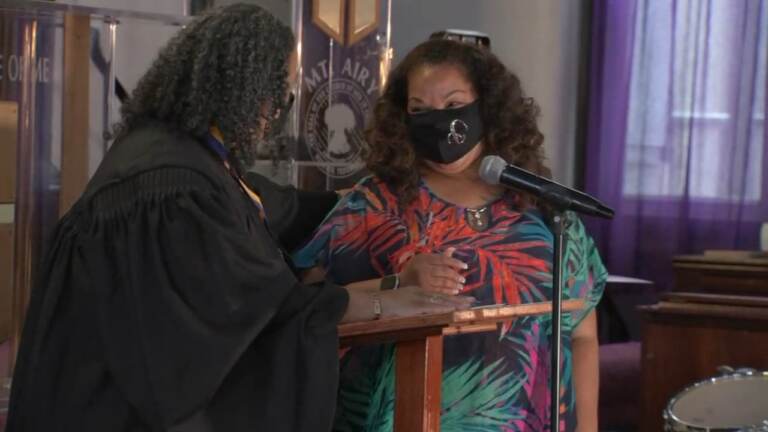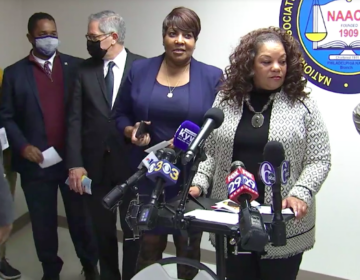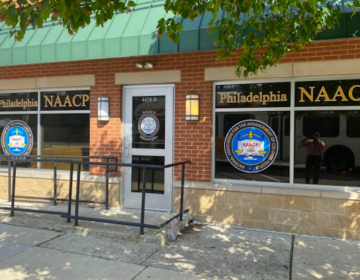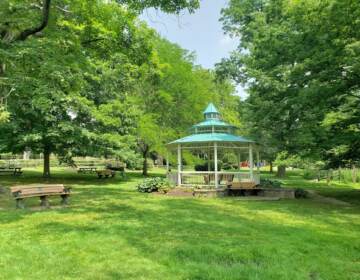Catherine Hicks marks six months at the helm of Philadelphia’s NAACP chapter
Hicks, who is also publisher of Philadelphia Sunday Sun, reflected on that time and what’s ahead for the chapter with WHYY’s Cherri Gregg.
Listen 7:00
Catherine Hicks is sworn in as the president of the Philadelphia NAACP. (6abc)
It’s been more than five months since the Philadelphia NAACP chapter installed its new president. Catherine Hicks is publisher of the Philadelphia Sunday Sun and a longtime member of the Philadelphia NAACP. In July, she became the first woman to be elected president of the more-than-a-century-old chapter and only the second woman to run it.
With a new year comes new priorities and new challenges. Hicks spoke with WHYY host Cherri Gregg about what’s ahead for the chapter under her administration.
Editor’s note: This transcript has been edited for clarity.
—
Cathy, welcome.
Thank you.
You’ve been president of the Philadelphia NAACP for nearly six months now. How has your tenure been thus far?
We have a lot going on, and it has been exciting, it has been busy, productive, and we’re eager to continue in 2022.
And just to be clear: Why did you decide to step up and run for president?
Well, at the time, remember, we had the pandemic. A lot of things were shut down … including the NAACP office. It was still open, but because we do have volunteers, they weren’t really able to come in and answer the phones and meet with the people. We had an election coming up, and I was getting word that people were saying, “Well, the NAACP is no longer relevant,” which is not true. I felt that the Philadelphia branch has always been a strong, dynamic, engaged branch, and I’ve been a part of it. And when no one stepped up, I said, “This is an opportunity for us to continue,” and you know, for me to use some of their ideas and visions that I had to take it forward.
Part of your administration’s theme is: “The time is now.” But there’s so much that ‘now’ is the time for. How do you plan the focus?
We have a number of committees that are engaged in really doing things not only with the community, but with some initiatives that are important to us this year. Education, violence, drug addiction, discrimination, ACT-SO and our committee for the Youth Economic Development, all of these committees we’re stepping up and making sure that those initiatives, that they are a part of what they are focused on. I am the president, but we have a whole group behind us that is making sure that things that we want to put out there, we’re able to do as a collective.
Last month, the NAACP’s Germantown Avenue office was shot up alongside the office of State Sen. Sharif Street. Neither office was the target, but you joined anti-violence leaders in speaking out. What did this incident reveal to you?
You’re not safe anywhere, because it’s happening on every corner in every neighborhood. Yes, the NAACP office was not the target, nor was Senator Street’s, but our buildings were hit. How many deaths have we had this year because it was just someone who just happened to be in the wrong place at the wrong time? Thankfully, the office was closed. It happened 11 o’clock at night. At the end of the day, this could have been during the day, but we felt like we have to speak up because we are literally at war.
You mentioned that you decided to step up because you have been hearing that the NAACP wasn’t relevant anymore. So I got to ask you: The chapter had a rocky road. The past president, Rodney Muhammad, had been under fire for some anti-Semitic remarks or posts on Facebook. The national NAACP had to step in. How do you repair the chapter — or do you see yourself as repairing the chapter — and building another type of community presence, because it’s been a minute?
You know, with regards to Rodney, I have to applaud him for stepping up at the time that he did. He was making every effort to keep this branch strong. What happened was unfortunate, and what we’re trying to do is repair how the branch is viewed. We have said from the beginning when I ran for office that we are willing to work with anyone that is willing to work with us. We do not discriminate against other organizations. We work with a lot of Jewish and Asian Americans, African Americans; we work with an array of organizations. We welcome them. We want them to know that, yes, our doors are open to everyone.
What do you think the Philadelphia NAACP does well? And what are its challenges?
I think engaging the community, we do that well. We get information out. I mean, if you look on our social media pages, the information that we put out, our meetings now, we are attracting more people who are showing up to find out what’s going on than ever before. What we need to do, what we have to do, is regain the trust of the community. We do have to let them know that we are here, and that we are answering phone calls and we are supporting the community. We are partnering with all types of organizations to make sure that our voices [are] heard. That’s, I think, the major part of what we want to make sure that we do right.
And I wish you luck on that. And I got to, you know, mention Jerry Mondesire, who I knew very well. Jerry was one of the longest-serving presidents of the NAACP and passed away several years ago. His tenure for the NAACP ended in some controversy as he was removed as chapter president, but he did so much good. When you look back at all that he did for so long, what do you think his legacy was?
I think his legacy was giving back and standing up for those who couldn’t stand up for themselves. Jerry was always in the forefront of whatever situation was going on. You knew you were going to hear his voice. He not only had his radio program, but he used the paper and all sorts of other avenues of making sure that his voice was heard. And it was very hard not to hear his voice, and I’ve learned a lot from him. So, you know, I am taking, you know, some of the chapters out of his book … trying to make sure that I can do some of even what he did. I can never completely step in his shoes, but I hope to also be an example that, you know, the Philadelphia chapter can be proud.
And I got to mention, you two were life partners, and now you’ve taken over the chapter. You guys have more than 1,000 members, is that correct?
Yes, we have over, I believe, 1,500 members, and a large number of them are lifetime members as well. And that started, of course, under the tutelage of Jerry Mondesire.
And so, as we wrap up, what do you want people to know about the Philadelphia NAACP under your leadership?
I want you to know that we’re here, that we are engaged. We would like people to join because, again, it takes a village to do everything that we are trying to do.
Thank you so much, Cathy, for being here.
Thank you. I appreciate you, Cherri.
—
Catherine Hicks, publisher of the Philadelphia Sunday Sun, will celebrate six months as president of the Philadelphia NAACP in the coming days.
The Philadelphia chapter meets the third Tuesday of every month. The group is hosting a prayer breakfast on Jan. 29 from 10 a.m. to 1 p.m. Details are available at naacpphillybranch.org/.
WHYY is your source for fact-based, in-depth journalism and information. As a nonprofit organization, we rely on financial support from readers like you. Please give today.







